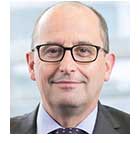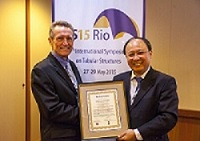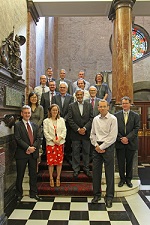 Welcome to the Lloyd’s Register Foundation’s June newsletter. It’s apparent that the Foundation is now ramping up, turning our strategy in practicality. While it’s important that we identify and fund the right sort of activities in support of our charitable mission, turning this into impact and benefit to society is key. Hence we’re pleased to mention in the newsletter about Prof Y.S. Choo’s prestigious award for the Foundation-funded work he’s doing in Singapore.
Welcome to the Lloyd’s Register Foundation’s June newsletter. It’s apparent that the Foundation is now ramping up, turning our strategy in practicality. While it’s important that we identify and fund the right sort of activities in support of our charitable mission, turning this into impact and benefit to society is key. Hence we’re pleased to mention in the newsletter about Prof Y.S. Choo’s prestigious award for the Foundation-funded work he’s doing in Singapore.
At the beginning of July is the Foundation Board meeting at which we have some exciting proposals to the trustees for funding. I look forward to reporting on these in the next newsletter as well as updating you further about the major grant programmes we already have underway.
As always, there’s more information, updates and guidance on our website and social media platforms. If you have any questions or examples of impact the Foundation is achieving, then please feel free to send them to me. We always look forward to receiving your feedback and suggestions.
Keep safe and best regards
Richard Clegg
Professor YS Choo received prestigious Kurobane Award at 15th International Symposium on Tubular Structures Professor Yoo Sang Choo, the Lloyd’s Register Foundation Professor at National University of Singapore, presented the recent Kurobane Lecture. He received the prestigious 8th Kurobane Award at the International Symposium on Tubular Structures (ISTS) on 27 May 2015 in Rio de Janeiro, Brazil. The ISTS is considered the principal showcase for tubular structures and the prime international forum for discussion on research, developments and applications in this field. The International Institute of Welding (IIW) Sub commission XVE selected Professor Choo as the 8th Kurobane Lecturer in recognition of his outstanding contributions and achievements in the field of Tubular Structures. His lecture, Tubular connections – NUS research and applications, highlighted the R&D results on tubular structures that have provided insights and bases for code development, and applied to offshore and onshore structural design and construction.
Professor Yoo Sang Choo, the Lloyd’s Register Foundation Professor at National University of Singapore, presented the recent Kurobane Lecture. He received the prestigious 8th Kurobane Award at the International Symposium on Tubular Structures (ISTS) on 27 May 2015 in Rio de Janeiro, Brazil. The ISTS is considered the principal showcase for tubular structures and the prime international forum for discussion on research, developments and applications in this field. The International Institute of Welding (IIW) Sub commission XVE selected Professor Choo as the 8th Kurobane Lecturer in recognition of his outstanding contributions and achievements in the field of Tubular Structures. His lecture, Tubular connections – NUS research and applications, highlighted the R&D results on tubular structures that have provided insights and bases for code development, and applied to offshore and onshore structural design and construction.
Prof. Jeffrey Packer, Chairman of ISTS15 International Programme Committee, presenting the Kurobane Award to Prof. Yoo Sang Choo
UK-South Africa Newton Fund Workshop: industry-academia engagement
On Monday 8 June in Pretoria, South Africa, the Foundation and Lloyd's Register co-hosted a one-day workshop with the Royal Academy of Engineering and the National Research Foundation, with support from the British High Commission in South Africa. The purpose was to design models of industry/academia collaboration, and to build science, innovation and R&D ties between South Africa and the UK. Under the Newton Fund partnership, both governments have committed £8 million per year. With around 30 participants the workshop was designed to lead to specific actions and responsibilities. Case studies highlighted how to improve engineering teaching, deliver industry experience and build models of collaboration. The workshop chair was Allyson Lawless FREng. Among her other accolades, Allyson was the first female president of the South African Institution of Civil Engineering in 2000. Tony Field, Marine Area Manager – Middle East & Africa, spoke on behalf of Lloyd’s Register and the Foundation on the subject of research collaboration models to improve safety through technology, focusing on our group technology centres in Southampton and Singapore. We are hoping that the workshop will help the Foundation to identify opportunities for us to meet our charitable mission and objectives through improving safety of engineering assets.
For more on the Newton Fund and Higher Education Partnerships click here
The Foundation partner up with RAEng for Research Fellowships
The Foundation has worked in partnership with the UK’s Royal Academy of Engineering to identify the first joint Lloyd’s Register Foundation – Royal Academy of Engineering research fellow. These Royal Academy prestigious and highly competitive five year Fellowships provide support for the highest quality post-doctoral engineering researchers, to encourage them to develop their academic research as a stepping stone to a successful research career. Dr Mark Batty of the University of Kent will be funded by the Foundation to develop a rigorous mathematical description of concurrency in poorly understood computer systems, towards supporting the wider assurance of networked critical infrastructures.
Structural integrity and systems performance foresight review
Two workshops were held to generate the next in our series of foresight reviews. Structural integrity and systems performance is one of our priority research areas under the strategic theme of supporting excellent scientific research. The first workshop was held at 71 Fenchurch Street in London on 4-5 June and the second took place at the University of Singapore on 15-16 June.
 The workshops aimed to answer the following questions:
The workshops aimed to answer the following questions:
- In the context of the Foundation’s mission, what are the potential applications in structural integrity and systems performance, where the Foundation could focus funding to maximise societal benefit?
- What are the gaps in our ability to understand, communicate or implement these applications?
- In which technological areas should the Foundation focus its research to ensure research excellence and maximised impact?
 In mid-July we will be posting the key findings of the review on our website for an open consultation to ensure that we draw on the widest possible input into this review process. We will provide more information on how to participate in the open consultation nearer the time.
In mid-July we will be posting the key findings of the review on our website for an open consultation to ensure that we draw on the widest possible input into this review process. We will provide more information on how to participate in the open consultation nearer the time.
The structural integrity and systems performance foresight review will be published in August.
The findings of the foresight review will give us guidance on our future funding strategy in this funding priority area.
Information Centre digitisation update
After months of research for the digitisation project funded by the Foundation, the action phase is finally commencing. A large portion of this is working out exactly what we have in the archives. As a result, the Digitisation Team have been spending time down in the archive, counting and categorising material and developing an intimate knowledge of the collection. This phase requires a significant time to garner an accurate picture of the archive’s contents so a representative sample is being surveyed to give an indication of the whole collection. So far, around a quarter of the archive has been examined and estimated and many treasures have been discovered. It’s a mammoth task as the archive consists of 4287 boxes containing around 600,000 - 700,000 individual papers and plans
Simultaneously, work on the first and famous ships is being undertaken to determine which documents still remain in the archive and their condition. So far, the famous & first list has 116 LR classed ships. The list compiles noteworthy or innovative ships that were from the 19th & 20th century. We’d love to hear your recommendations so email Sean Clemenson
The next phase of the venture will be to properly catalogue the archive and take images of the documents included in the pilot project. As a result, several potential providers are being sent material to demonstrate what they could do with the contents of the archives and the quality of the resulting images. Furthermore, to accompany this endeavour, the Foundation is planning to hold a conference on “The Future of Archives” with regards to emerging digital technologies, that should inform our own project, as well as enriching those of other heritage institutions, encouraging emerging young professionals and fostering relationships with similar institutions.
The project also continues to network with a number of different bodies, including the National Maritime Museum’s ship model collection. Recently, we had two members of the museum visit our offices in London to see our own ship model collection and to discuss digitisation.
The project is accompanied by constant, honest discussion on the blog and public interest in this resource has continued to snowball with over 850 visitors and 1,800 views being recorded so far from 53 countries on six continents. Alternatively, if you’d like to keep updated about LR’s Digitisation project or would like to see discover LR’s incredible history follow here on Twitter.